Comprehensive Analysis of Tesco's Business Resources Report
VerifiedAdded on 2020/06/06
|9
|2656
|49
Report
AI Summary
This report provides a comprehensive analysis of Tesco's business resources. It begins by examining recruitment documentation, including job descriptions and specifications, and then explores the essential employability, personal, and communication skills required for various job roles within the company. The report delves into the physical and technological resources utilized by Tesco, providing an overview of key software and platforms. It further investigates the sources of internal and external finance available to Tesco, including equity, debentures, and retained earnings. Additionally, the report interprets the contents of Tesco's trading and profit and loss account and balance sheet, illustrating the use of budgets as a means of exercising financial control. Finally, it presents an illustration of Tesco's financial state through ratio analysis. The report covers various aspects of Tesco's business operations and financial strategies.
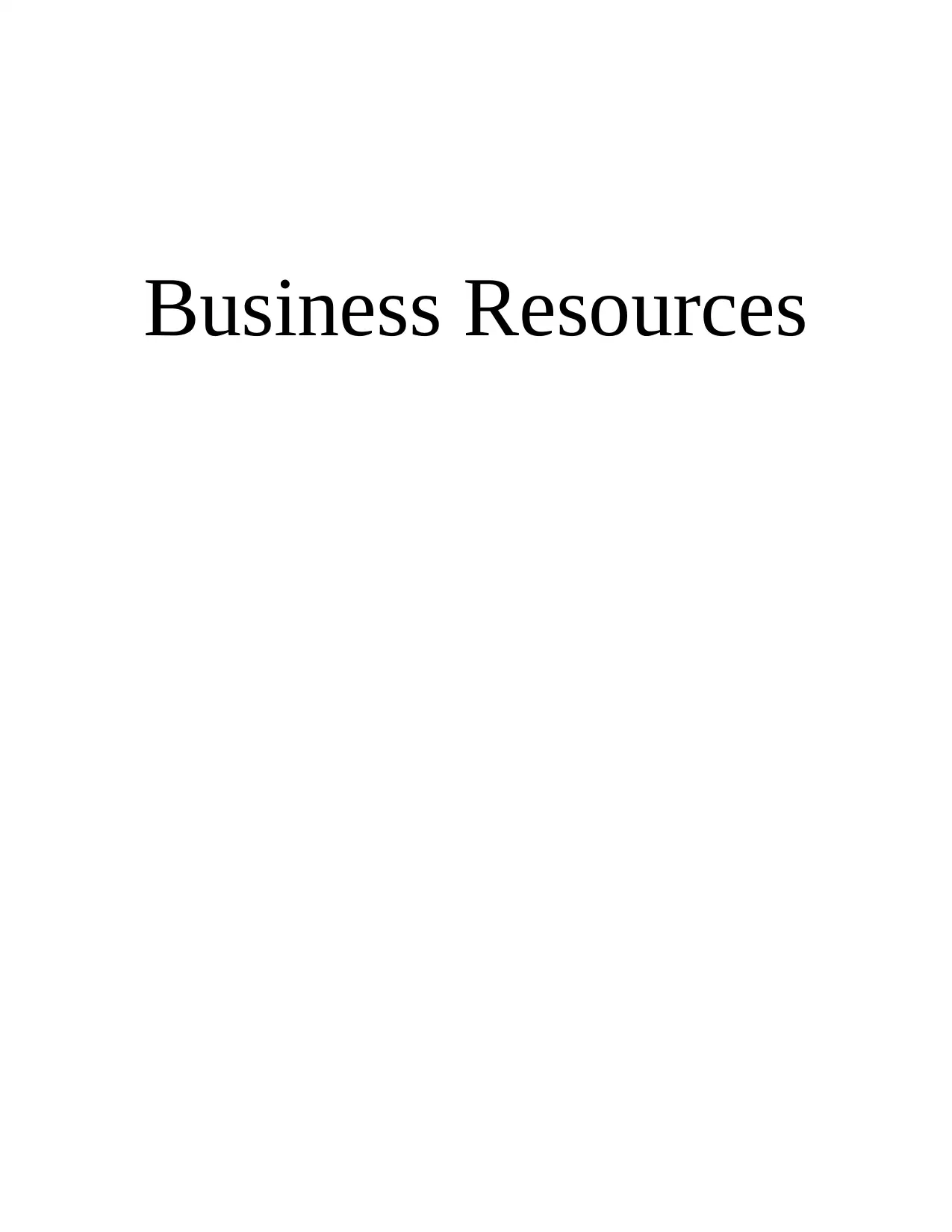
Business Resources
Paraphrase This Document
Need a fresh take? Get an instant paraphrase of this document with our AI Paraphraser
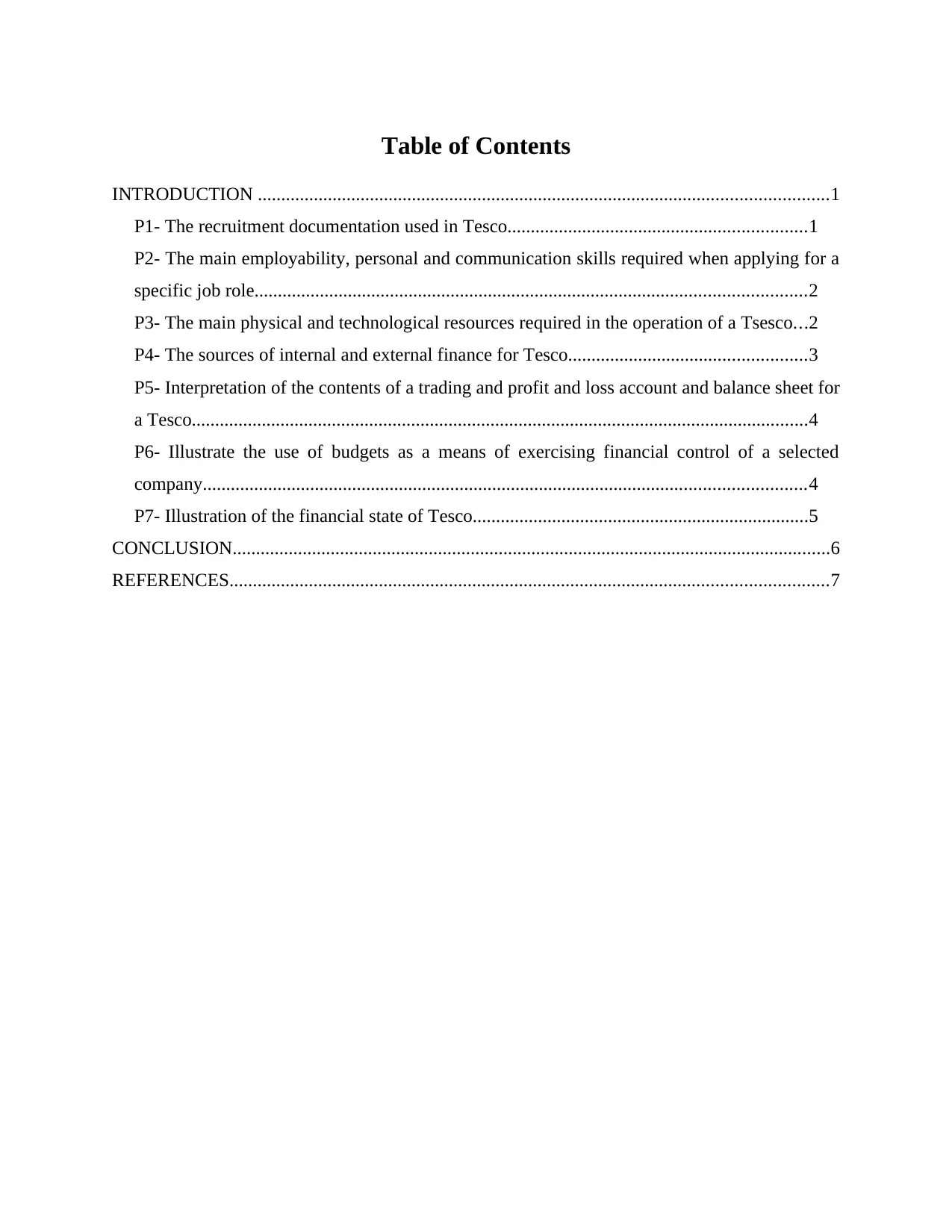
Table of Contents
INTRODUCTION ..........................................................................................................................1
P1- The recruitment documentation used in Tesco................................................................1
P2- The main employability, personal and communication skills required when applying for a
specific job role......................................................................................................................2
P3- The main physical and technological resources required in the operation of a Tsesco...2
P4- The sources of internal and external finance for Tesco...................................................3
P5- Interpretation of the contents of a trading and profit and loss account and balance sheet for
a Tesco....................................................................................................................................4
P6- Illustrate the use of budgets as a means of exercising financial control of a selected
company.................................................................................................................................4
P7- Illustration of the financial state of Tesco........................................................................5
CONCLUSION................................................................................................................................6
REFERENCES................................................................................................................................7
INTRODUCTION ..........................................................................................................................1
P1- The recruitment documentation used in Tesco................................................................1
P2- The main employability, personal and communication skills required when applying for a
specific job role......................................................................................................................2
P3- The main physical and technological resources required in the operation of a Tsesco...2
P4- The sources of internal and external finance for Tesco...................................................3
P5- Interpretation of the contents of a trading and profit and loss account and balance sheet for
a Tesco....................................................................................................................................4
P6- Illustrate the use of budgets as a means of exercising financial control of a selected
company.................................................................................................................................4
P7- Illustration of the financial state of Tesco........................................................................5
CONCLUSION................................................................................................................................6
REFERENCES................................................................................................................................7
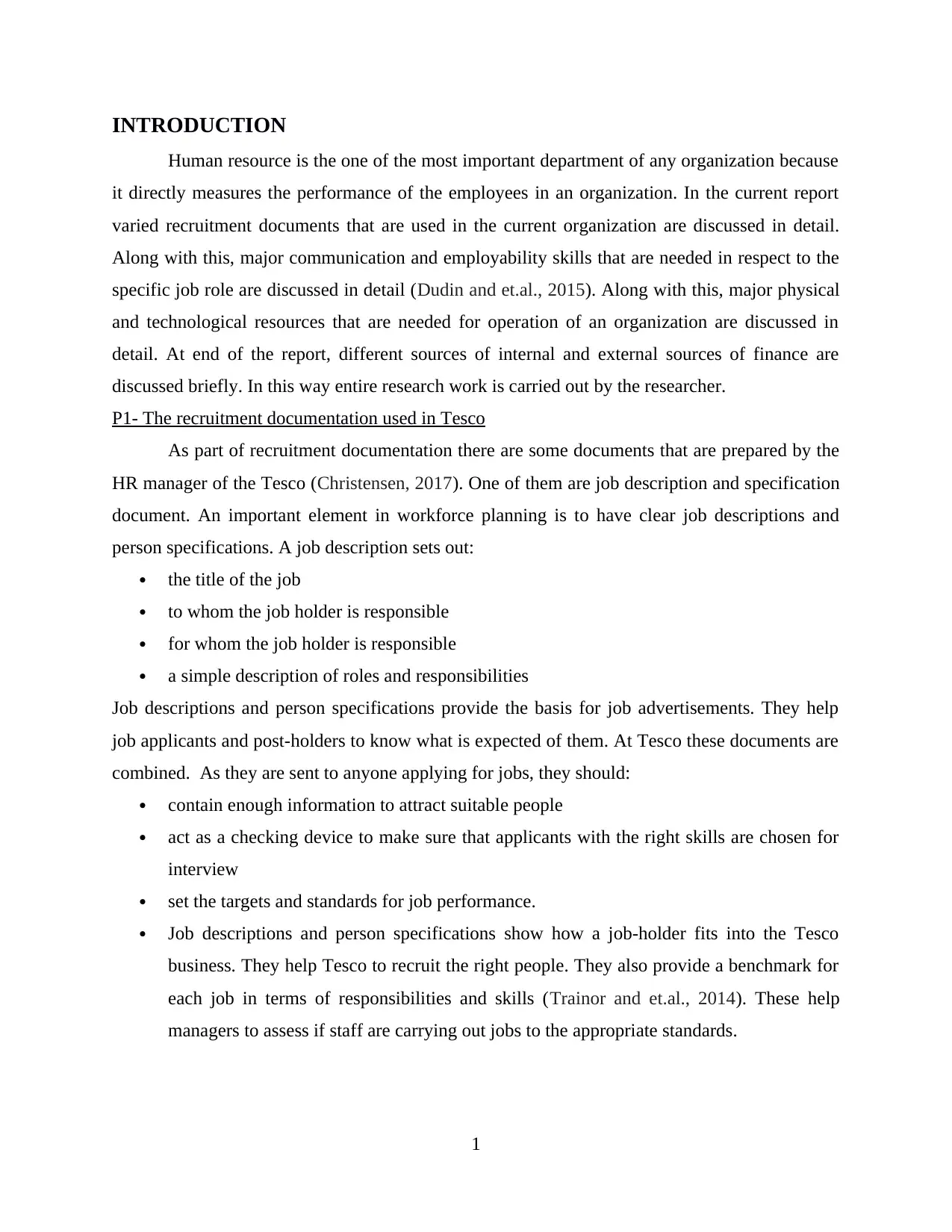
INTRODUCTION
Human resource is the one of the most important department of any organization because
it directly measures the performance of the employees in an organization. In the current report
varied recruitment documents that are used in the current organization are discussed in detail.
Along with this, major communication and employability skills that are needed in respect to the
specific job role are discussed in detail (Dudin and et.al., 2015). Along with this, major physical
and technological resources that are needed for operation of an organization are discussed in
detail. At end of the report, different sources of internal and external sources of finance are
discussed briefly. In this way entire research work is carried out by the researcher.
P1- The recruitment documentation used in Tesco
As part of recruitment documentation there are some documents that are prepared by the
HR manager of the Tesco (Christensen, 2017). One of them are job description and specification
document. An important element in workforce planning is to have clear job descriptions and
person specifications. A job description sets out:
the title of the job
to whom the job holder is responsible
for whom the job holder is responsible
a simple description of roles and responsibilities
Job descriptions and person specifications provide the basis for job advertisements. They help
job applicants and post-holders to know what is expected of them. At Tesco these documents are
combined. As they are sent to anyone applying for jobs, they should:
contain enough information to attract suitable people
act as a checking device to make sure that applicants with the right skills are chosen for
interview
set the targets and standards for job performance.
Job descriptions and person specifications show how a job-holder fits into the Tesco
business. They help Tesco to recruit the right people. They also provide a benchmark for
each job in terms of responsibilities and skills (Trainor and et.al., 2014). These help
managers to assess if staff are carrying out jobs to the appropriate standards.
1
Human resource is the one of the most important department of any organization because
it directly measures the performance of the employees in an organization. In the current report
varied recruitment documents that are used in the current organization are discussed in detail.
Along with this, major communication and employability skills that are needed in respect to the
specific job role are discussed in detail (Dudin and et.al., 2015). Along with this, major physical
and technological resources that are needed for operation of an organization are discussed in
detail. At end of the report, different sources of internal and external sources of finance are
discussed briefly. In this way entire research work is carried out by the researcher.
P1- The recruitment documentation used in Tesco
As part of recruitment documentation there are some documents that are prepared by the
HR manager of the Tesco (Christensen, 2017). One of them are job description and specification
document. An important element in workforce planning is to have clear job descriptions and
person specifications. A job description sets out:
the title of the job
to whom the job holder is responsible
for whom the job holder is responsible
a simple description of roles and responsibilities
Job descriptions and person specifications provide the basis for job advertisements. They help
job applicants and post-holders to know what is expected of them. At Tesco these documents are
combined. As they are sent to anyone applying for jobs, they should:
contain enough information to attract suitable people
act as a checking device to make sure that applicants with the right skills are chosen for
interview
set the targets and standards for job performance.
Job descriptions and person specifications show how a job-holder fits into the Tesco
business. They help Tesco to recruit the right people. They also provide a benchmark for
each job in terms of responsibilities and skills (Trainor and et.al., 2014). These help
managers to assess if staff are carrying out jobs to the appropriate standards.
1
⊘ This is a preview!⊘
Do you want full access?
Subscribe today to unlock all pages.

Trusted by 1+ million students worldwide
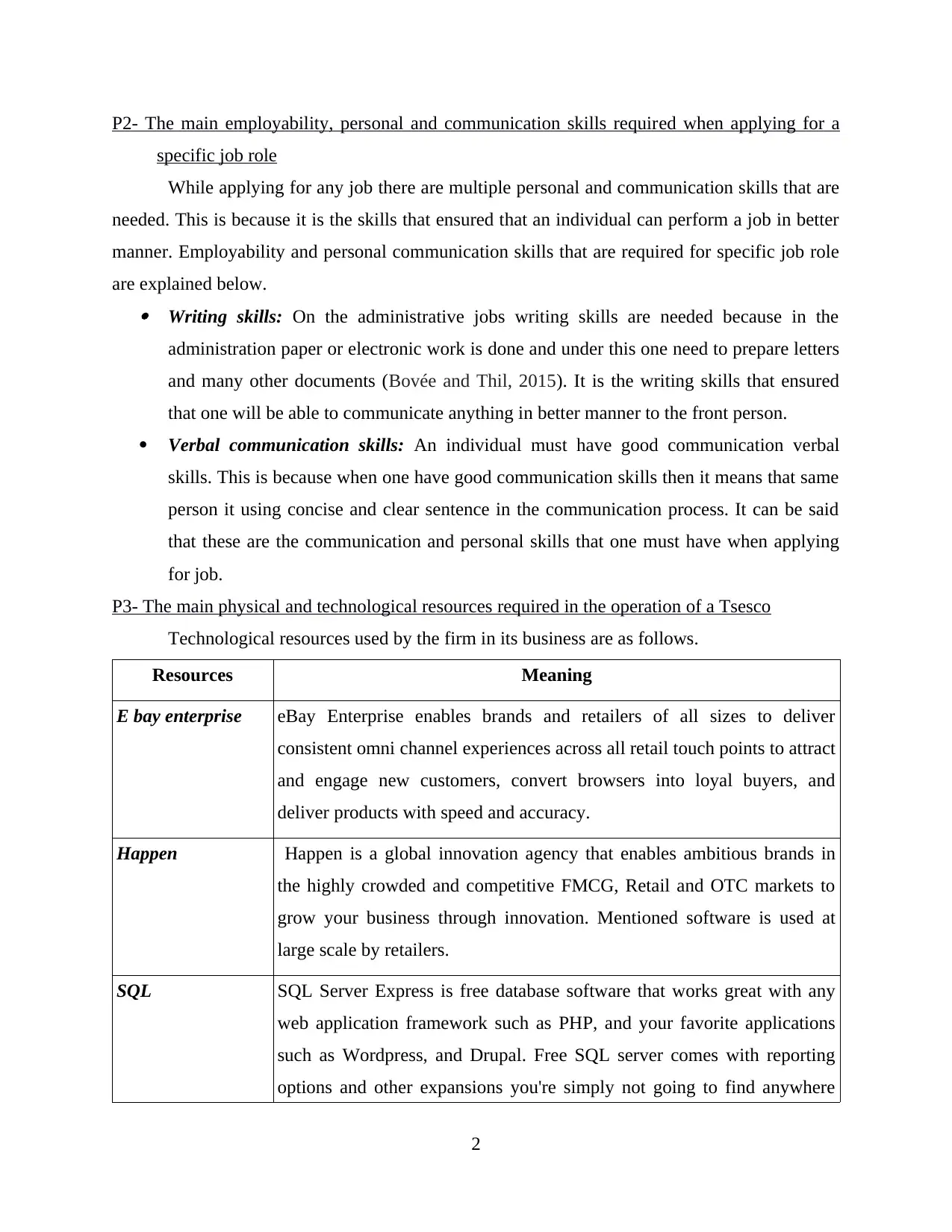
P2- The main employability, personal and communication skills required when applying for a
specific job role
While applying for any job there are multiple personal and communication skills that are
needed. This is because it is the skills that ensured that an individual can perform a job in better
manner. Employability and personal communication skills that are required for specific job role
are explained below. Writing skills: On the administrative jobs writing skills are needed because in the
administration paper or electronic work is done and under this one need to prepare letters
and many other documents (Bovée and Thil, 2015). It is the writing skills that ensured
that one will be able to communicate anything in better manner to the front person.
Verbal communication skills: An individual must have good communication verbal
skills. This is because when one have good communication skills then it means that same
person it using concise and clear sentence in the communication process. It can be said
that these are the communication and personal skills that one must have when applying
for job.
P3- The main physical and technological resources required in the operation of a Tsesco
Technological resources used by the firm in its business are as follows.
Resources Meaning
E bay enterprise eBay Enterprise enables brands and retailers of all sizes to deliver
consistent omni channel experiences across all retail touch points to attract
and engage new customers, convert browsers into loyal buyers, and
deliver products with speed and accuracy.
Happen Happen is a global innovation agency that enables ambitious brands in
the highly crowded and competitive FMCG, Retail and OTC markets to
grow your business through innovation. Mentioned software is used at
large scale by retailers.
SQL SQL Server Express is free database software that works great with any
web application framework such as PHP, and your favorite applications
such as Wordpress, and Drupal. Free SQL server comes with reporting
options and other expansions you're simply not going to find anywhere
2
specific job role
While applying for any job there are multiple personal and communication skills that are
needed. This is because it is the skills that ensured that an individual can perform a job in better
manner. Employability and personal communication skills that are required for specific job role
are explained below. Writing skills: On the administrative jobs writing skills are needed because in the
administration paper or electronic work is done and under this one need to prepare letters
and many other documents (Bovée and Thil, 2015). It is the writing skills that ensured
that one will be able to communicate anything in better manner to the front person.
Verbal communication skills: An individual must have good communication verbal
skills. This is because when one have good communication skills then it means that same
person it using concise and clear sentence in the communication process. It can be said
that these are the communication and personal skills that one must have when applying
for job.
P3- The main physical and technological resources required in the operation of a Tsesco
Technological resources used by the firm in its business are as follows.
Resources Meaning
E bay enterprise eBay Enterprise enables brands and retailers of all sizes to deliver
consistent omni channel experiences across all retail touch points to attract
and engage new customers, convert browsers into loyal buyers, and
deliver products with speed and accuracy.
Happen Happen is a global innovation agency that enables ambitious brands in
the highly crowded and competitive FMCG, Retail and OTC markets to
grow your business through innovation. Mentioned software is used at
large scale by retailers.
SQL SQL Server Express is free database software that works great with any
web application framework such as PHP, and your favorite applications
such as Wordpress, and Drupal. Free SQL server comes with reporting
options and other expansions you're simply not going to find anywhere
2
Paraphrase This Document
Need a fresh take? Get an instant paraphrase of this document with our AI Paraphraser
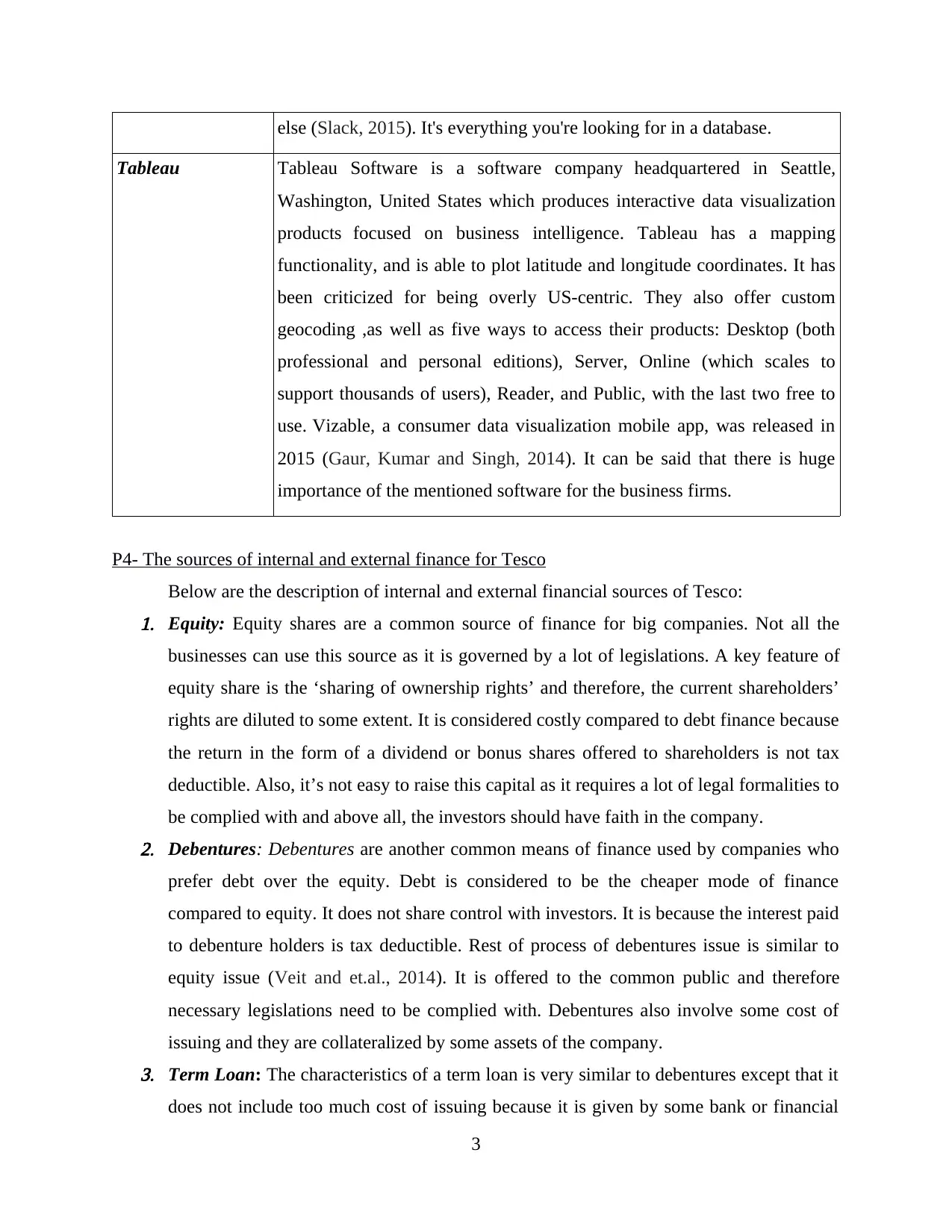
else (Slack, 2015). It's everything you're looking for in a database.
Tableau Tableau Software is a software company headquartered in Seattle,
Washington, United States which produces interactive data visualization
products focused on business intelligence. Tableau has a mapping
functionality, and is able to plot latitude and longitude coordinates. It has
been criticized for being overly US-centric. They also offer custom
geocoding ,as well as five ways to access their products: Desktop (both
professional and personal editions), Server, Online (which scales to
support thousands of users), Reader, and Public, with the last two free to
use. Vizable, a consumer data visualization mobile app, was released in
2015 (Gaur, Kumar and Singh, 2014). It can be said that there is huge
importance of the mentioned software for the business firms.
P4- The sources of internal and external finance for Tesco
Below are the description of internal and external financial sources of Tesco:1. Equity: Equity shares are a common source of finance for big companies. Not all the
businesses can use this source as it is governed by a lot of legislations. A key feature of
equity share is the ‘sharing of ownership rights’ and therefore, the current shareholders’
rights are diluted to some extent. It is considered costly compared to debt finance because
the return in the form of a dividend or bonus shares offered to shareholders is not tax
deductible. Also, it’s not easy to raise this capital as it requires a lot of legal formalities to
be complied with and above all, the investors should have faith in the company.2. Debentures: Debentures are another common means of finance used by companies who
prefer debt over the equity. Debt is considered to be the cheaper mode of finance
compared to equity. It does not share control with investors. It is because the interest paid
to debenture holders is tax deductible. Rest of process of debentures issue is similar to
equity issue (Veit and et.al., 2014). It is offered to the common public and therefore
necessary legislations need to be complied with. Debentures also involve some cost of
issuing and they are collateralized by some assets of the company.3. Term Loan: The characteristics of a term loan is very similar to debentures except that it
does not include too much cost of issuing because it is given by some bank or financial
3
Tableau Tableau Software is a software company headquartered in Seattle,
Washington, United States which produces interactive data visualization
products focused on business intelligence. Tableau has a mapping
functionality, and is able to plot latitude and longitude coordinates. It has
been criticized for being overly US-centric. They also offer custom
geocoding ,as well as five ways to access their products: Desktop (both
professional and personal editions), Server, Online (which scales to
support thousands of users), Reader, and Public, with the last two free to
use. Vizable, a consumer data visualization mobile app, was released in
2015 (Gaur, Kumar and Singh, 2014). It can be said that there is huge
importance of the mentioned software for the business firms.
P4- The sources of internal and external finance for Tesco
Below are the description of internal and external financial sources of Tesco:1. Equity: Equity shares are a common source of finance for big companies. Not all the
businesses can use this source as it is governed by a lot of legislations. A key feature of
equity share is the ‘sharing of ownership rights’ and therefore, the current shareholders’
rights are diluted to some extent. It is considered costly compared to debt finance because
the return in the form of a dividend or bonus shares offered to shareholders is not tax
deductible. Also, it’s not easy to raise this capital as it requires a lot of legal formalities to
be complied with and above all, the investors should have faith in the company.2. Debentures: Debentures are another common means of finance used by companies who
prefer debt over the equity. Debt is considered to be the cheaper mode of finance
compared to equity. It does not share control with investors. It is because the interest paid
to debenture holders is tax deductible. Rest of process of debentures issue is similar to
equity issue (Veit and et.al., 2014). It is offered to the common public and therefore
necessary legislations need to be complied with. Debentures also involve some cost of
issuing and they are collateralized by some assets of the company.3. Term Loan: The characteristics of a term loan is very similar to debentures except that it
does not include too much cost of issuing because it is given by some bank or financial
3
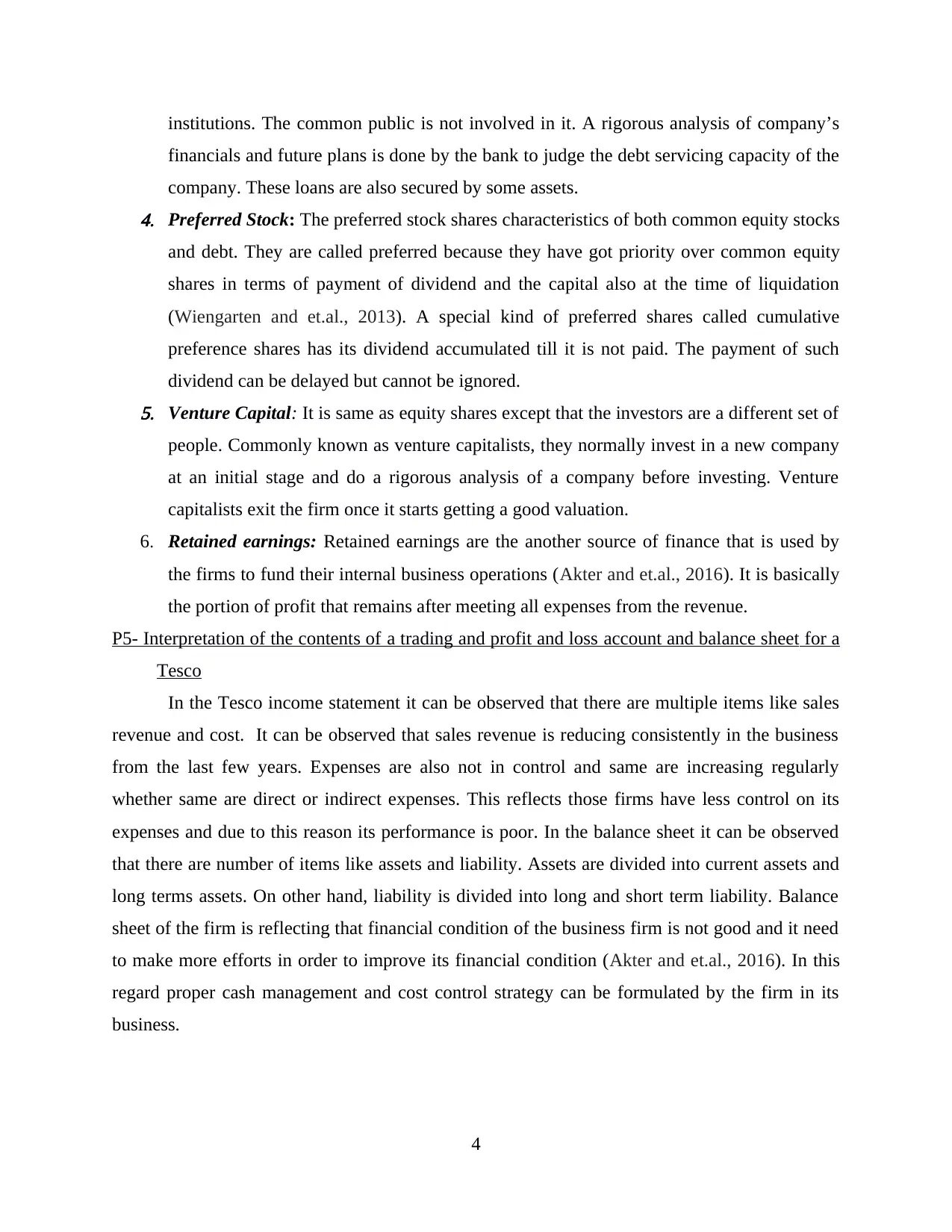
institutions. The common public is not involved in it. A rigorous analysis of company’s
financials and future plans is done by the bank to judge the debt servicing capacity of the
company. These loans are also secured by some assets.4. Preferred Stock: The preferred stock shares characteristics of both common equity stocks
and debt. They are called preferred because they have got priority over common equity
shares in terms of payment of dividend and the capital also at the time of liquidation
(Wiengarten and et.al., 2013). A special kind of preferred shares called cumulative
preference shares has its dividend accumulated till it is not paid. The payment of such
dividend can be delayed but cannot be ignored.5. Venture Capital: It is same as equity shares except that the investors are a different set of
people. Commonly known as venture capitalists, they normally invest in a new company
at an initial stage and do a rigorous analysis of a company before investing. Venture
capitalists exit the firm once it starts getting a good valuation.
6. Retained earnings: Retained earnings are the another source of finance that is used by
the firms to fund their internal business operations (Akter and et.al., 2016). It is basically
the portion of profit that remains after meeting all expenses from the revenue.
P5- Interpretation of the contents of a trading and profit and loss account and balance sheet for a
Tesco
In the Tesco income statement it can be observed that there are multiple items like sales
revenue and cost. It can be observed that sales revenue is reducing consistently in the business
from the last few years. Expenses are also not in control and same are increasing regularly
whether same are direct or indirect expenses. This reflects those firms have less control on its
expenses and due to this reason its performance is poor. In the balance sheet it can be observed
that there are number of items like assets and liability. Assets are divided into current assets and
long terms assets. On other hand, liability is divided into long and short term liability. Balance
sheet of the firm is reflecting that financial condition of the business firm is not good and it need
to make more efforts in order to improve its financial condition (Akter and et.al., 2016). In this
regard proper cash management and cost control strategy can be formulated by the firm in its
business.
4
financials and future plans is done by the bank to judge the debt servicing capacity of the
company. These loans are also secured by some assets.4. Preferred Stock: The preferred stock shares characteristics of both common equity stocks
and debt. They are called preferred because they have got priority over common equity
shares in terms of payment of dividend and the capital also at the time of liquidation
(Wiengarten and et.al., 2013). A special kind of preferred shares called cumulative
preference shares has its dividend accumulated till it is not paid. The payment of such
dividend can be delayed but cannot be ignored.5. Venture Capital: It is same as equity shares except that the investors are a different set of
people. Commonly known as venture capitalists, they normally invest in a new company
at an initial stage and do a rigorous analysis of a company before investing. Venture
capitalists exit the firm once it starts getting a good valuation.
6. Retained earnings: Retained earnings are the another source of finance that is used by
the firms to fund their internal business operations (Akter and et.al., 2016). It is basically
the portion of profit that remains after meeting all expenses from the revenue.
P5- Interpretation of the contents of a trading and profit and loss account and balance sheet for a
Tesco
In the Tesco income statement it can be observed that there are multiple items like sales
revenue and cost. It can be observed that sales revenue is reducing consistently in the business
from the last few years. Expenses are also not in control and same are increasing regularly
whether same are direct or indirect expenses. This reflects those firms have less control on its
expenses and due to this reason its performance is poor. In the balance sheet it can be observed
that there are number of items like assets and liability. Assets are divided into current assets and
long terms assets. On other hand, liability is divided into long and short term liability. Balance
sheet of the firm is reflecting that financial condition of the business firm is not good and it need
to make more efforts in order to improve its financial condition (Akter and et.al., 2016). In this
regard proper cash management and cost control strategy can be formulated by the firm in its
business.
4
⊘ This is a preview!⊘
Do you want full access?
Subscribe today to unlock all pages.

Trusted by 1+ million students worldwide
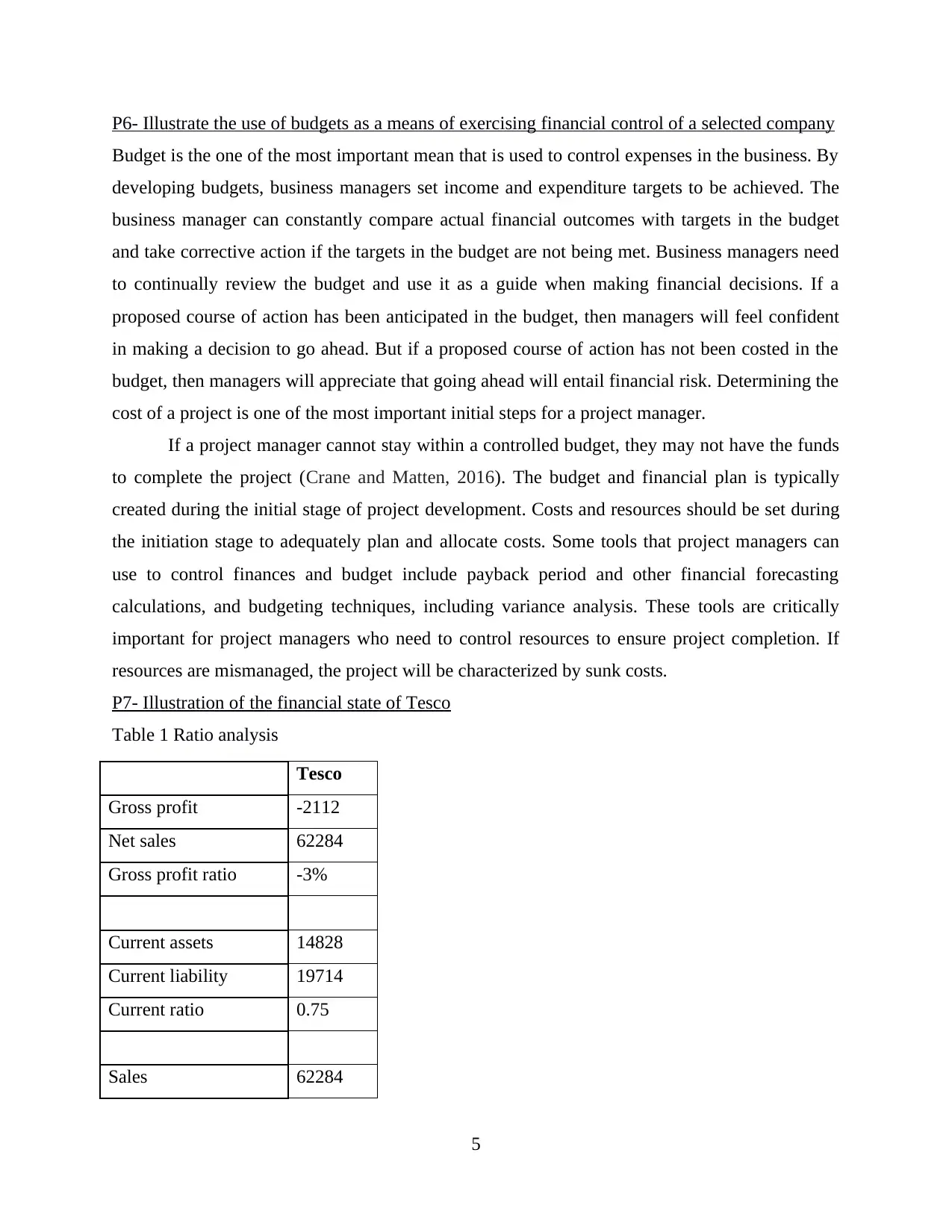
P6- Illustrate the use of budgets as a means of exercising financial control of a selected company
Budget is the one of the most important mean that is used to control expenses in the business. By
developing budgets, business managers set income and expenditure targets to be achieved. The
business manager can constantly compare actual financial outcomes with targets in the budget
and take corrective action if the targets in the budget are not being met. Business managers need
to continually review the budget and use it as a guide when making financial decisions. If a
proposed course of action has been anticipated in the budget, then managers will feel confident
in making a decision to go ahead. But if a proposed course of action has not been costed in the
budget, then managers will appreciate that going ahead will entail financial risk. Determining the
cost of a project is one of the most important initial steps for a project manager.
If a project manager cannot stay within a controlled budget, they may not have the funds
to complete the project (Crane and Matten, 2016). The budget and financial plan is typically
created during the initial stage of project development. Costs and resources should be set during
the initiation stage to adequately plan and allocate costs. Some tools that project managers can
use to control finances and budget include payback period and other financial forecasting
calculations, and budgeting techniques, including variance analysis. These tools are critically
important for project managers who need to control resources to ensure project completion. If
resources are mismanaged, the project will be characterized by sunk costs.
P7- Illustration of the financial state of Tesco
Table 1 Ratio analysis
Tesco
Gross profit -2112
Net sales 62284
Gross profit ratio -3%
Current assets 14828
Current liability 19714
Current ratio 0.75
Sales 62284
5
Budget is the one of the most important mean that is used to control expenses in the business. By
developing budgets, business managers set income and expenditure targets to be achieved. The
business manager can constantly compare actual financial outcomes with targets in the budget
and take corrective action if the targets in the budget are not being met. Business managers need
to continually review the budget and use it as a guide when making financial decisions. If a
proposed course of action has been anticipated in the budget, then managers will feel confident
in making a decision to go ahead. But if a proposed course of action has not been costed in the
budget, then managers will appreciate that going ahead will entail financial risk. Determining the
cost of a project is one of the most important initial steps for a project manager.
If a project manager cannot stay within a controlled budget, they may not have the funds
to complete the project (Crane and Matten, 2016). The budget and financial plan is typically
created during the initial stage of project development. Costs and resources should be set during
the initiation stage to adequately plan and allocate costs. Some tools that project managers can
use to control finances and budget include payback period and other financial forecasting
calculations, and budgeting techniques, including variance analysis. These tools are critically
important for project managers who need to control resources to ensure project completion. If
resources are mismanaged, the project will be characterized by sunk costs.
P7- Illustration of the financial state of Tesco
Table 1 Ratio analysis
Tesco
Gross profit -2112
Net sales 62284
Gross profit ratio -3%
Current assets 14828
Current liability 19714
Current ratio 0.75
Sales 62284
5
Paraphrase This Document
Need a fresh take? Get an instant paraphrase of this document with our AI Paraphraser
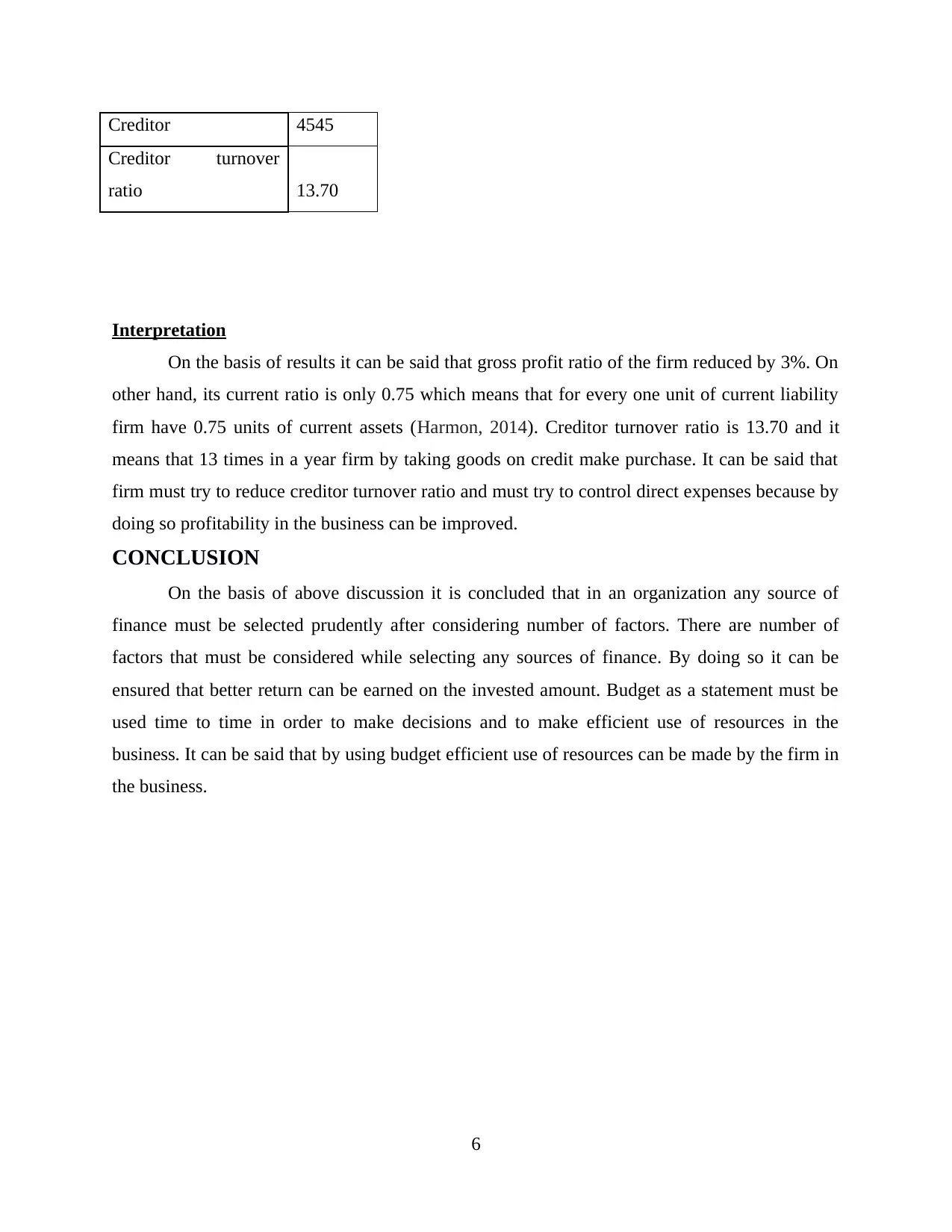
Creditor 4545
Creditor turnover
ratio 13.70
Interpretation
On the basis of results it can be said that gross profit ratio of the firm reduced by 3%. On
other hand, its current ratio is only 0.75 which means that for every one unit of current liability
firm have 0.75 units of current assets (Harmon, 2014). Creditor turnover ratio is 13.70 and it
means that 13 times in a year firm by taking goods on credit make purchase. It can be said that
firm must try to reduce creditor turnover ratio and must try to control direct expenses because by
doing so profitability in the business can be improved.
CONCLUSION
On the basis of above discussion it is concluded that in an organization any source of
finance must be selected prudently after considering number of factors. There are number of
factors that must be considered while selecting any sources of finance. By doing so it can be
ensured that better return can be earned on the invested amount. Budget as a statement must be
used time to time in order to make decisions and to make efficient use of resources in the
business. It can be said that by using budget efficient use of resources can be made by the firm in
the business.
6
Creditor turnover
ratio 13.70
Interpretation
On the basis of results it can be said that gross profit ratio of the firm reduced by 3%. On
other hand, its current ratio is only 0.75 which means that for every one unit of current liability
firm have 0.75 units of current assets (Harmon, 2014). Creditor turnover ratio is 13.70 and it
means that 13 times in a year firm by taking goods on credit make purchase. It can be said that
firm must try to reduce creditor turnover ratio and must try to control direct expenses because by
doing so profitability in the business can be improved.
CONCLUSION
On the basis of above discussion it is concluded that in an organization any source of
finance must be selected prudently after considering number of factors. There are number of
factors that must be considered while selecting any sources of finance. By doing so it can be
ensured that better return can be earned on the invested amount. Budget as a statement must be
used time to time in order to make decisions and to make efficient use of resources in the
business. It can be said that by using budget efficient use of resources can be made by the firm in
the business.
6
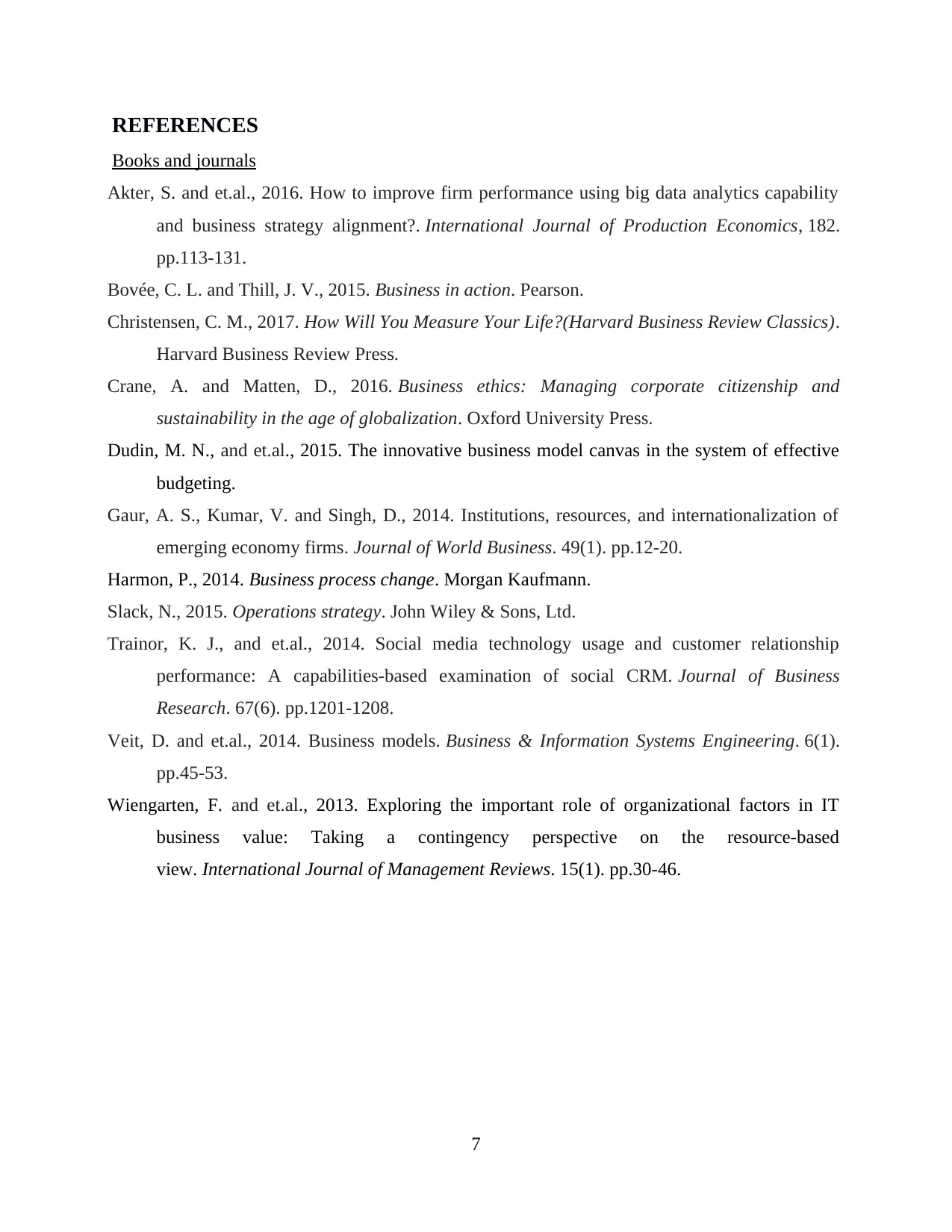
REFERENCES
Books and journals
Akter, S. and et.al., 2016. How to improve firm performance using big data analytics capability
and business strategy alignment?. International Journal of Production Economics, 182.
pp.113-131.
Bovée, C. L. and Thill, J. V., 2015. Business in action. Pearson.
Christensen, C. M., 2017. How Will You Measure Your Life?(Harvard Business Review Classics).
Harvard Business Review Press.
Crane, A. and Matten, D., 2016. Business ethics: Managing corporate citizenship and
sustainability in the age of globalization. Oxford University Press.
Dudin, M. N., and et.al., 2015. The innovative business model canvas in the system of effective
budgeting.
Gaur, A. S., Kumar, V. and Singh, D., 2014. Institutions, resources, and internationalization of
emerging economy firms. Journal of World Business. 49(1). pp.12-20.
Harmon, P., 2014. Business process change. Morgan Kaufmann.
Slack, N., 2015. Operations strategy. John Wiley & Sons, Ltd.
Trainor, K. J., and et.al., 2014. Social media technology usage and customer relationship
performance: A capabilities-based examination of social CRM. Journal of Business
Research. 67(6). pp.1201-1208.
Veit, D. and et.al., 2014. Business models. Business & Information Systems Engineering. 6(1).
pp.45-53.
Wiengarten, F. and et.al., 2013. Exploring the important role of organizational factors in IT
business value: Taking a contingency perspective on the resource‐based
view. International Journal of Management Reviews. 15(1). pp.30-46.
7
Books and journals
Akter, S. and et.al., 2016. How to improve firm performance using big data analytics capability
and business strategy alignment?. International Journal of Production Economics, 182.
pp.113-131.
Bovée, C. L. and Thill, J. V., 2015. Business in action. Pearson.
Christensen, C. M., 2017. How Will You Measure Your Life?(Harvard Business Review Classics).
Harvard Business Review Press.
Crane, A. and Matten, D., 2016. Business ethics: Managing corporate citizenship and
sustainability in the age of globalization. Oxford University Press.
Dudin, M. N., and et.al., 2015. The innovative business model canvas in the system of effective
budgeting.
Gaur, A. S., Kumar, V. and Singh, D., 2014. Institutions, resources, and internationalization of
emerging economy firms. Journal of World Business. 49(1). pp.12-20.
Harmon, P., 2014. Business process change. Morgan Kaufmann.
Slack, N., 2015. Operations strategy. John Wiley & Sons, Ltd.
Trainor, K. J., and et.al., 2014. Social media technology usage and customer relationship
performance: A capabilities-based examination of social CRM. Journal of Business
Research. 67(6). pp.1201-1208.
Veit, D. and et.al., 2014. Business models. Business & Information Systems Engineering. 6(1).
pp.45-53.
Wiengarten, F. and et.al., 2013. Exploring the important role of organizational factors in IT
business value: Taking a contingency perspective on the resource‐based
view. International Journal of Management Reviews. 15(1). pp.30-46.
7
⊘ This is a preview!⊘
Do you want full access?
Subscribe today to unlock all pages.

Trusted by 1+ million students worldwide
1 out of 9
Related Documents
Your All-in-One AI-Powered Toolkit for Academic Success.
+13062052269
info@desklib.com
Available 24*7 on WhatsApp / Email
![[object Object]](/_next/static/media/star-bottom.7253800d.svg)
Unlock your academic potential
Copyright © 2020–2026 A2Z Services. All Rights Reserved. Developed and managed by ZUCOL.





